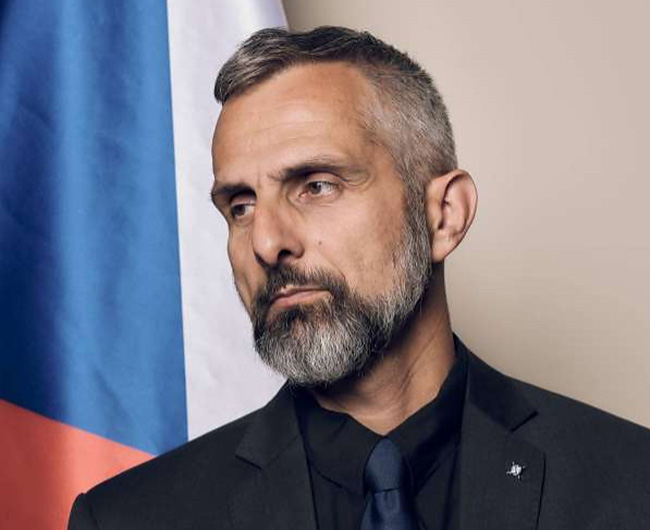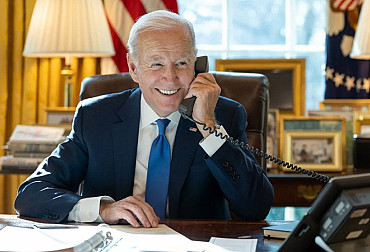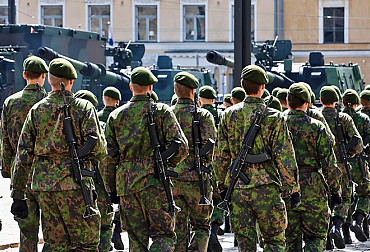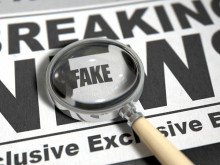A state that does not promote itself will cease to be a state, says Otakar Foltýn
At the end of May, Otakar Foltýn, former Chief of the Military Police, was appointed the first government coordinator for strategic communications. In this role, he focuses on creating strong and effective communication of the state's core values, as well as combating disinformation and foreign influence. In the following interview, he talks candidly about his first impressions of his new role, the goals and priorities he has set himself, the challenges he faces, and the reasons why he initially turned down the role.

How would you define strategic communication in your own words?
Strategic communication is the coordination of the activities, actions and actual communication of key state institutions in such a way that they are ideally able to promote, engender and maintain citizens' trust in the state and in the functioning of state institutions in an authentic, valuable, meaningful, yet appealing and even entertaining way.

Can you give us an idea of what your role as Government Strategic Communications Coordinator entails?
Strategic communication has been a highly underestimated area so far. Beyond the coordination itself, it is important to focus on what is visible, i.e. communication. This means articulating the core objectives, but also the core values, which I consider to be shared, trans-partisan and at the moment hardly communicated.
What motivated you to accept the new role?
I didn't accept it. I turned it down. Several other people turned it down after me, and then I thought it was cowardly not to accept it. I see it as something that needs to be done. Certainly not something that will benefit my career. The result will be exactly the opposite. It'll probably end my career, but that's what happens to soldiers.

Why did you turn down the role in the first place?
Because, like the others, I couldn't see what was essential for successful communication. It's not the people, the resources, the spreadsheets or the office, it's the will. That is, first we need to see that we really want to do this communication in a non-partisan, meaningful and effective way. And that is something I have subsequently somehow introduced. And then it was just a matter of duty, because I think, like many others, the state should do it. So let's go.
You've been in office less than a month. What are your first impressions?
I have a very good feeling about the team that's going to be in place next month. Of course, less so about the environment itself, because I expected what happened. That is, there will be another shitstorm from the level of, let's say, anti-system entities, the disinformation scene and Russophile websites and profiles. Which of course happened. It happened with the expected level of aggression, including threats and name-calling. What surprises me a bit is the occasional fire from within our own ranks. But I guess even that's something you have to put up with.
What experiences from the past do you consider most important for your current role?
Basic training at Vyškov Military Academy. In other words - all the time nobody is satisfied with your performance and makes it very explicit. (laughs) That was a joke, of course. But yes, probably just some form of psychological resilience, because in reality I don't give a damn about the antics of these little scumbags and useful idiots of Russian propaganda. On the contrary, it's a kind of badge of honour that I'm doing it right.
How will you combat disinformation and foreign influence in your role?
Well, hardly! Seriously. Most people get the two terms - strategic communications and disinformation - a bit confused. Strategic communication is one tool to counter the effects of misinformation, but it is definitely not the same thing. A lot of people imagine that we will now somehow start to counter disinformation, but I have neither the brief, nor the tools, nor the competence to do that. What we are going to do is precisely that communication which, if we do it well, will also reduce the scope for what we call disinformation.
What are your main goals and priorities in this new role?
First, to make strategic communication visible. Second, that key players, from the political representation to the opposition parties to at least part of the public, get used to the fact that the state also has the right to communicate. Not only the right, but also the duty. Explaining to citizens the fundamental values on which this state is based is a truly cross-party issue. I understand that it does not suit those who have already made their business out of the hate trade. For them, of course, any positive communication of positive values is like a red rag. But we have to do it, because it's just not there in society. A state that does not promote itself ceases to be a state. The state must explain what our common values are. It reminds us of what we have in common, and what makes it worth living in the same state. It is a thing that we should achieve in the shortest possible time anyway, because we have lost 30 years.
What role should strategic communication play in improving national security?
In the new information environment of the 21st century, security is closely intertwined - both in the physical real world, in cyberspace, and in what is called cognitive warfare. That is, what the citizens of each population have in their heads. You just can't separate the two today. It could never be separated, to be honest, but the new information environment has made what's in our heads so relevant that some wars can be won without firing a shot, and all you have to do is manipulate that target population, which Russia knows very well. They know that warfare in the physical world is expensive, whereas this is cheap. If we're not defending ourselves, we should start defending ourselves.
There has been a lot of talk lately about the idea of creating a European army. How do you view this question?
We have a rule in the army: "When you feel the need to change something, first see if what you already have is working well. If what you already have is working, don't touch it." A European army, of course, in the long term is something that is certainly not wrong. I can imagine experiencing a European army in one of my next lives, but I don't think it will be in this one. And I don't even think it would be a good idea, at least at this point in time. Let's strengthen the European wing of NATO, let's strengthen our own armies, the combat capability of our own armies within NATO. What Russia is afraid of is NATO. What Russia is definitely not afraid of is the European army. So let's build what it is afraid of, because that means it is effective. The North Atlantic alliance defeated the Soviet Union in the Cold War and perfectly deters the current Russia from taking any aggressive step on a military level against NATO. If it works, let us not invent other things. We need an honest approach to our own security and investment in our own defence - and we are not going to replace that with some European army.
What we can do, if anyone is really serious about a European army, is to create a gendarmerie force. That means gendarmerie corps, which are basically units with a police role, but with a military structure and equipment that are certainly the tool that will be needed in Africa. They are suitable for dealing with the migration crisis, but also for, say, peacekeeping missions, stabilisation operations and so on. It is a much less demanding task than building a full-fledged European army. And when Europe has managed to build up a gendarmerie force, which will certainly not be a useless job and will be suitable for those tasks, then we can talk about something else. So far, I do not see such an operational gendarmerie force, so if we still cannot do the small task, let us not throw ourselves into the larger one, which, on the contrary, NATO is doing very well.
So if a gendarmerie force were to be created and operational, what impact would it have on current military alliances, just like NATO?
None at all. If we build up a gendarmerie force at European level, it has nothing to do with NATO. NATO does not mind, on the contrary, I think it would be beneficial for NATO, so let us stick to it.
How should the Czech Republic respond to the growing security risks in the world?
By being a reliable partner within the alliances. The Czechs are certainly not a marginal nation, but we are not a superpower either. It is in our interest to continue to be part of the largest military alliance in history, which is NATO, because that is the only way we can be sure that our interests will not be undermined by military activities or intimidation by Russia. Let us stop being a stowaway, let us invest in our own defence. By the way, the constantly mentioned 2% for defence as a commitment - these funds do not go to NATO, but stay in the Czech Republic. It is an investment in the Czech army. Therefore, let us start by being honest with ourselves and having our own combat-capable army.
What would you recommend to young people who want to pursue a career in security and communications?
The defence duty of the future is information literacy. So in the first place - learn to understand the world around you. Just as we are trying to understand the younger generation, try to understand us, because for the rest of our lives and half of your lives we will have to work together. And it's not us and them, it's still us, even though our optics of viewing the world around us may be different due to age. Let's learn to define our common interests. We must realize, in the case of both the young and the old, that the security situation has changed and we must do something for our country. Let's not try to talk our way out of it. There is no way around it, there is no way to just survive in a corner somehow. If we are to base our relationship with each other and with society on dignity, then dignity is definitely not sticking our heads in the sand. No one has to go into the trenches involuntarily, our ancestors had to do that, but in any case everyone should be responsible to the state, at least at the level of information literacy.



















